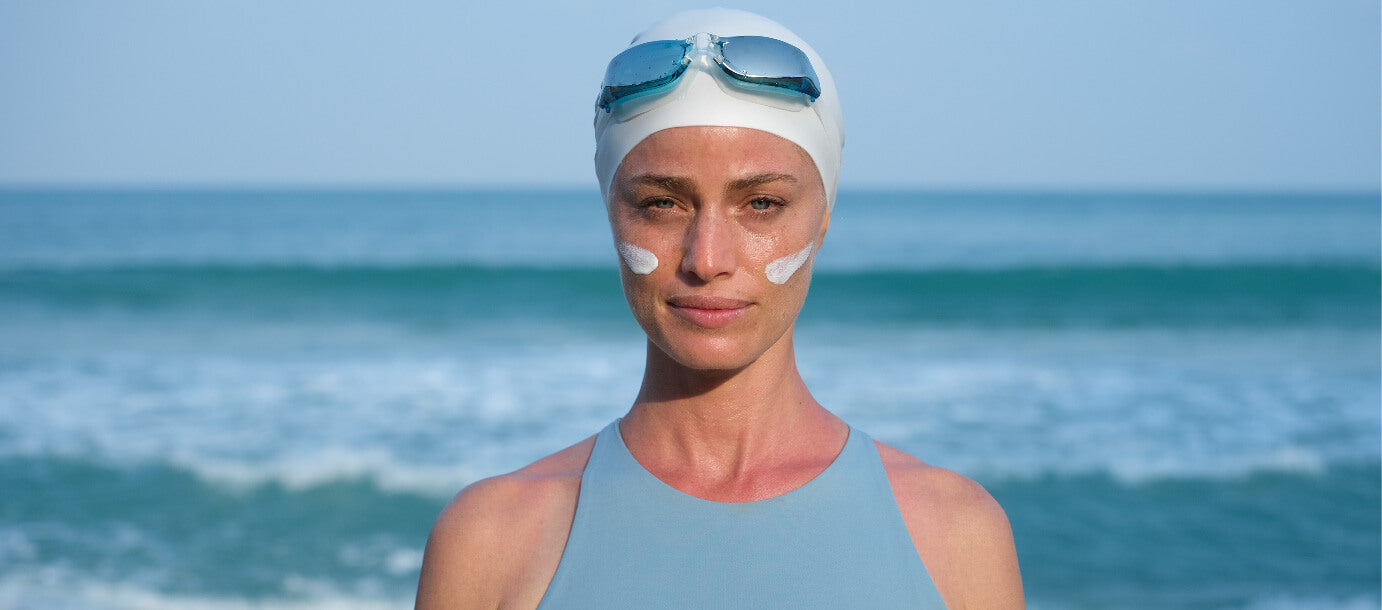
25% OFF + FREE SHIPPING ON YOUR FIRST ORDER. LEARN MORE.
FREE SHIPPING ON ALL ORDERS $99+
25% OFF + FREE SHIPPING ON YOUR FIRST ORDER. LEARN MORE.
FREE SHIPPING ON ALL ORDERS $99+
✕
Shop All
Diving into Reef-Safe Sunscreen: Your Top Questions Answered
by Jude Jacob August 02, 2023

In recent years, the term "reef-safe" or "reef-friendly" sunscreen has gained significant attention, highlighting the importance of protecting both our skin and delicate marine ecosystems. As we become more conscious of the environmental impact of certain chemicals found in conventional sunscreens, the demand for reef-safe alternatives has grown. In this article, we will explore what reef safe sunscreen means, the benefits of mineral sunscreen, the regions that have banned certain sunscreens, and the exceptional reef-safe options offered by FRÉ Skincare.
What Does Reef-Safe Sunscreen Mean?
Reef-safe or reef-friendly sunscreen refers to products that are formulated without harmful chemicals that can harm coral reefs and marine life. Traditional chemical sunscreens often contain harmful substances such as oxybenzone and octinoxate, which have been shown to cause coral bleaching, disrupt the growth of coral, and harm marine organisms. Reef-safe sunscreens aim to protect our skin while minimizing the negative impact on these fragile ecosystems.

How do I know if sunscreen is "reef-friendly"?
Regrettably, the term "reef-friendly" lacks regulation, making it difficult to rely solely on products labeled as such. To ensure the absence of reef-damaging chemicals, it is crucial to verify the "active ingredients" listed on the back of your sunscreen or personal care product. Look for mineral-based sunscreens that use zinc oxide or titanium dioxide as their primary active ingredients, as these are generally considered safe for reefs.
What Are The Benefits of Mineral Sunscreen?
Mineral sunscreens, also known as physical or
mineral-based sunscreens, have many benefits that
make them a better choice for your skin’s health.
Mineral sunscreens' active ingredients, zinc oxide or
titanium dioxide, create a protective barrier
on the skin’s surface, which blocks UV rays
from penetrating the skin.
These ingredients are not absorbed by the skin.
On the other hand, the active ingredients in chemical sunscreens
are absorbed by the skin, and then these chemicals
absorb the UV rays. Since mineral sunscreens provide barrier
protection from sun damage, they are effective immediately
after application. Chemical sunscreens, alternatively, need time
to be properly absorbed by the skin, about 15 minutes,
before they can effectively protect you from UV radiation.
Additionally, as mineral sunscreens are not absorbed by the skin,
it is less likely that they will cause irritation, making
them ideal for sensitive skin.
What countries have banned Certain sunscreens and why?
Several regions have taken significant steps to protect their marine ecosystems by banning the sale of sunscreens containing harmful ingredients. Some notable destinations include Hawaii, the U.S. Virgin Islands, Aruba, Key West in Florida, Bonaire, Palau, and certain ecotourism reserves in Mexico. These areas have implemented policies to ensure that only reef-safe sunscreens are used, helping to preserve their stunning coral reefs and marine life. Each destination has specific regulations in place, so it is essential to familiarize yourself with the laws when visiting.
FRÉ Skincare's Reef-Safe Sunscreen:
PROTECT ME and GLOW ME+
FRÉ Skincare is committed to providing high-quality, reef-safe sunscreens that prioritize both your skin's health and environmental well-being.

- PROTECT ME is a lightweight, mineral-based face sunscreen that offers broad-spectrum SPF 30 protection. Its non-greasy formula is perfect for daily use and is designed to be suitable for all skin types, leaving no white cast.
- GLOW ME+ is a tinted moisturizer with mineral SPF 30 that combines mineral sunscreen and moisturizer with all-day glowy coverage.
Wear Mineral Sunscreen!
Choosing reef-safe sunscreen is not only crucial for safeguarding our skin from the sun's harmful rays but also for preserving the delicate balance of our oceans. By opting for mineral-based sunscreens, verifying active ingredients, and supporting brands like FRÉ Skincare that prioritize reef-safe formulations, we can take steps towards protecting our skin and the environment simultaneously. Let's embrace the power of reef-safe sunscreen and contribute to the preservation of our beautiful coral reefs for generations to come.
Leave a comment
Comments will be approved before showing up.

